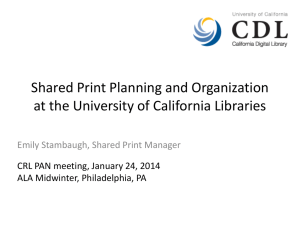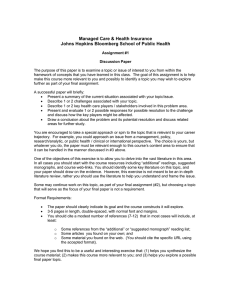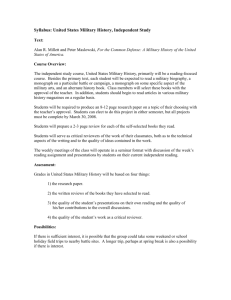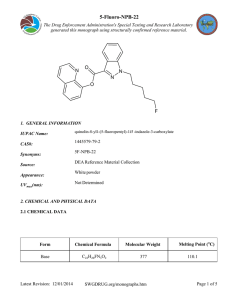Uploaded by
Seleman Abdallah - PM Consultant
Monograph Management Feasibility Study: UK Higher Education
advertisement
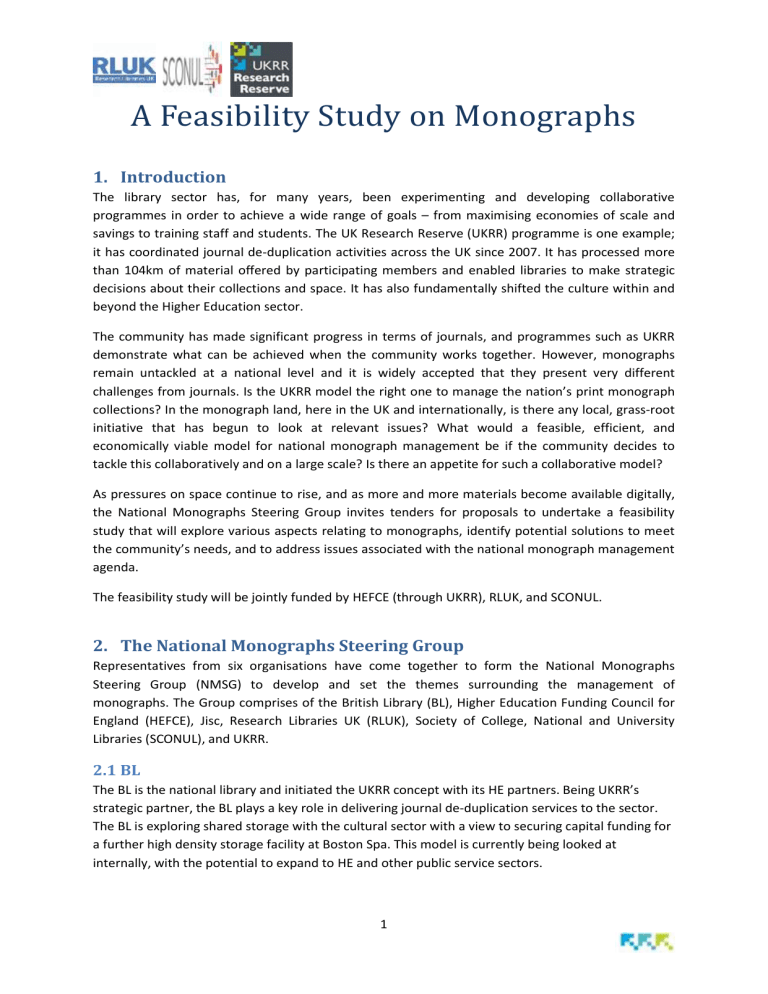
A Feasibility Study on Monographs 1. Introduction The library sector has, for many years, been experimenting and developing collaborative programmes in order to achieve a wide range of goals – from maximising economies of scale and savings to training staff and students. The UK Research Reserve (UKRR) programme is one example; it has coordinated journal de-duplication activities across the UK since 2007. It has processed more than 104km of material offered by participating members and enabled libraries to make strategic decisions about their collections and space. It has also fundamentally shifted the culture within and beyond the Higher Education sector. The community has made significant progress in terms of journals, and programmes such as UKRR demonstrate what can be achieved when the community works together. However, monographs remain untackled at a national level and it is widely accepted that they present very different challenges from journals. Is the UKRR model the right one to manage the nation’s print monograph collections? In the monograph land, here in the UK and internationally, is there any local, grass-root initiative that has begun to look at relevant issues? What would a feasible, efficient, and economically viable model for national monograph management be if the community decides to tackle this collaboratively and on a large scale? Is there an appetite for such a collaborative model? As pressures on space continue to rise, and as more and more materials become available digitally, the National Monographs Steering Group invites tenders for proposals to undertake a feasibility study that will explore various aspects relating to monographs, identify potential solutions to meet the community’s needs, and to address issues associated with the national monograph management agenda. The feasibility study will be jointly funded by HEFCE (through UKRR), RLUK, and SCONUL. 2. The National Monographs Steering Group Representatives from six organisations have come together to form the National Monographs Steering Group (NMSG) to develop and set the themes surrounding the management of monographs. The Group comprises of the British Library (BL), Higher Education Funding Council for England (HEFCE), Jisc, Research Libraries UK (RLUK), Society of College, National and University Libraries (SCONUL), and UKRR. 2.1 BL The BL is the national library and initiated the UKRR concept with its HE partners. Being UKRR’s strategic partner, the BL plays a key role in delivering journal de-duplication services to the sector. The BL is exploring shared storage with the cultural sector with a view to securing capital funding for a further high density storage facility at Boston Spa. This model is currently being looked at internally, with the potential to expand to HE and other public service sectors. 1 2.2 HEFCE HEFCE promotes and funds teaching and research in Higher Education Institutions (HEIs) in England. It has financially supported UKRR’s work so far. Its funding provision for UKRR Phase 3 allocates resources for a feasibility study to explore the possible expansion for monographs. 2.3 Jisc Following on from the publication of A national monograph strategy roadmap, Jisc is engaged in ongoing phases of work to improve prospects for Digital Access to Monographs and to build a National Bibliographic Knowledgebase (NBK). The Jisc-funded service SUNCAT (Serials Union Catalogue) works closely with UKRR and provides essential data that enables UKRR to manage the scarcity checking process centrally. 2.4 RLUK Monograph management has been identified as a priority area for RLUK libraries. Its recent reports, Strength in numbers and the Ithaka survey of academics, suggest that the overlap amongst RLUK libraries collections is low and that academics’ acceptance of electronic monographs has plateaued. However, the sector is not confident with the low overlap figures and suspects there maybe issues about the data accuracy. 2.5 SCONUL As the UK’s largest academic library membership organisation, responsible for representing teaching-focused and research-focused institutions, SCONUL is seeking highly innovative and effective collection management solutions to ensure libraries can maximise long-term sustainability of their collections and value for money. SCONUL sees the development of a national shared collection strategy as a crucial enabler of efficiency at individual library level and of the development of a national digital library for UK HE. 2.6 UKRR UKRR has been regarded as a trusted mechanism and ‘part of the infrastructure’ for the disposal of physical journal collections whilst ensuring access to and the collective print collection itself is managed and preserved. Its recent discussion with members concluded that there is a need to tackle monographs. By working within the European Print Initiatives Collaboration (EPICo), UKRR seeks to learn from best practice and explore potential to collaborate on a European level. 3. Indicative Budget The funding available for the feasibility study is up to £45,000 including VAT. 4. Terms of Reference 4.1 The NMSG is seeking a suitably qualified and experienced Consultant to carry out a feasibility study to understand the scope and scale of relevant issues and ultimately to identify potential options and strategies for a national monograph management project. 4.2 The feasibility study will be carried out over two stages. The first stage is expected to involve desk research and consultation to establish what has been done around various parts of the 2 community and to provide an in-depth understanding of the monograph landscape here in the UK and internationally. The second stage will expand on what’s been learned from the first stage, design and explore potential models, and gather first-hand evidence to support/reject identified models. Members of the NMSG have led, involved, and developed various initiatives and services relating to monographs. The winning bidder is encouraged to discuss with the group before undertaking desk research. 4.3 Bids should address, but not be limited to the following points: i) Monograph initiatives (1) Explore initiatives relating to monographs, current and proposed, in the UK and internationally (US and Europe in particular) – their strategies, models, and financial structures (2) Understand different dimensions of monograph management: de-duplication, shared storage, shared collections, digitisation projects, data quality and accuracy, collection overlaps, inter-library lending, etc. ii) Culture (1) Examine and investigate the community’s overall views about a national monograph management solution: (a) What is the current need for shared services in monograph management (e.g. the development of NBK and other initiatives)? (b) What is the anticipated need? (c) What is the appetite within libraries and institutions for shared solutions for monographs? In particular, with the term ‘shared solutions’, what do people envisage them to be - shared storage, shared collections (i.e. de-duplication and managed collaboratively), or others? If it’s about shared collections, is there a commitment towards the concept of a shared distributed regional or national collection? (d) Under a shared service model, what would be the best policy for ownership local ownership, shared ownership (e.g. local consortia) or national ownership (i.e. national distributed collection)? What are their pros and cons? (2) Establish factors that influence people’s responses to the above issues – for example, disciplinary differences, country of publication, date of publication, and geographical location of institution. iii) Physical storage (1) Explore the role of physical storage facilities in the context of national monograph management? (a) Is it essential? If so, who will be the most suitable partner to develop this further with – the BL, commercial suppliers, or consortia owned by the community? (2) Examine the current state of institutional/library storage (3) Analyse institutions’ interest in pursuing local, regional or national storage solutions? iv) Digital surrogates (1) Understand the landscape of digitisation projects 3 (a) Do we have the correct data to enable informed decision making between print and digital surrogates? (b) How easy is it to know if a digital surrogate exists for a given print item? (2) Evaluate how the existence of digital surrogates would/should affect discussions on retention and/or physical storage of print? v) Data (1) Analyse issues associated with data (a) What are the barriers to improving the quality of data? (b) Would institutions commit to upgrading and maintaining data in order to support a collective national initiative? (2) Understand challenges associated with data (a) Does the community have accurate data to enable matching and decisionmaking? vi) Inter-library lending (1) Consider the current Copyright, Designs and Patents Act and the proposed potential model(s): (a) Are current systems sufficiently robust? (b) Does rarity of ‘final’ copies affect willingness to lend? (c) Would reliable information on and availability of digital surrogates influence the number of copies retained in the distributed national collection? vii) Model(s) (1) Identify and evaluate potential models for print monograph management (a) What model(s) would best suit local needs? (b) What model(s) might be palatable to institutions/libraries? (2) Evaluate the concept of ‘preservation’ and ‘holding’ copies being developed by UKRR for journals and whether it is relevant for monographs and should be applied in a monograph model (3) Understand financial implications of a national monograph management project (a) What would be the estimated costs? (b) What would be the potential savings? (4) Analyse the effects and impact if the community takes no action 5. Deliverables and Timetable Tenders should be received no later than 12 noon 10 November 2016. Tenders received after the deadline will not be accepted. The timetable for this ITT is as follows and may be subject to change without further notice: 4 Activity ITT documentation issued Final date for questions Closing date for submissions Evaluation and selection process (shortlisted candidates will be invited to an interview) Interview Contract award and commencement Date 19 October 2016 4 November 2016 (12 noon) 10 November 2016 (12 noon) 21 November –9 December 2016 2 December 2016 13 December 2016 The study is expected to be completed in two stages: Stage 1 Duration: 1-2 months (scheduled to run between December 2016 and January 2017) The Consultant shall provide regular updates to the NMSG and a preliminary report and presentation at the end of Stage 1 and no later than 31 January 2017. A draft set of questions to be asked of the community is also expected to be delivered at the end of Stage 1. The NMSG will review the outcome of Stage 1 and provide feedback to the Consultant before the second stage begins. Stage 2 Duration: 2 months (scheduled to run between March and April 2017) The Consultant shall provide a written Interim Report and a presentation that outlines their findings to the NMSG in late March 2017 having addressed all of the themes/questions outlined above in the Terms of Reference. The NMSG will provide further feedback and clarification to the Consultant on the presentation and Interim Report that will enable the Consultant to address further issues and areas that require additional analysis and review. The Consultant shall carry out final analysis/review and provide a written Final Report and presentation to the NMSG by the 28th April 2017. 6. Method Statement The Consultant will need to submit as part of its tender a project plan, method statement, and any other relevant information on how they will deliver the brief and approach each of the stages set out above. In your project plan please set out the resources and number of days required for each of the above stages. 7. Pricing In your tender return please include the following: 7.1 The basis on which the fee for the Consultancy Service would be calculated 5 7.2 A flat fixed fee for all the consultancy work required incl. VAT 7.3 A breakdown of hourly charges and expected hours for each Stage to complete the consultancy work for the purposes of comparison 6
